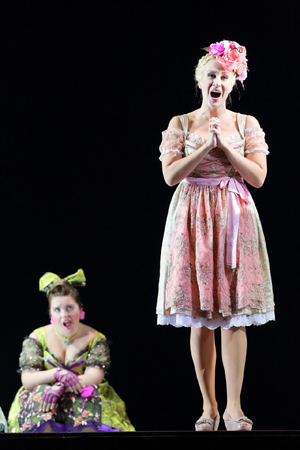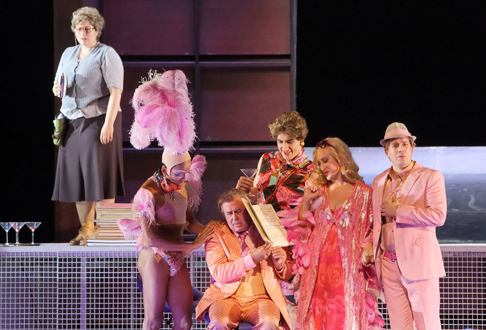![Brenda Rae as Aminta and Franz Hawlata as Sir Morosus [Photo courtesy of Bayerische Staatsoper]](http://www.operatoday.com/csm_11_3ed823933a.png)
07 Jul 2015
Die schweigsame Frau, Munich
If Strauss’s operas of the 1920s receive far too little performing attention, especially in the Anglosphere, those of the 1930s seem to fare worse still.
English Touring Opera are delighted to announce a season of lyric monodramas to tour nationally from October to December. The season features music for solo singer and piano by Argento, Britten, Tippett and Shostakovich with a bold and inventive approach to making opera during social distancing.
This tenth of ten Live from London concerts was in fact a recorded live performance from California. It was no less enjoyable for that, and it was also uplifting to learn that this wasn’t in fact the ‘last’ LfL event that we will be able to enjoy, courtesy of VOCES8 and their fellow vocal ensembles (more below …).
Ever since Wigmore Hall announced their superb series of autumn concerts, all streamed live and available free of charge, I’d been looking forward to this song recital by Ian Bostridge and Imogen Cooper.
Although Stile Antico’s programme article for their Live from London recital introduced their selection from the many treasures of the English Renaissance in the context of the theological debates and upheavals of the Tudor and Elizabethan years, their performance was more evocative of private chamber music than of public liturgy.
Evidently, face masks don’t stifle appreciative “Bravo!”s. And, reducing audience numbers doesn’t lower the volume of such acclamations. For, the audience at Wigmore Hall gave soprano Elizabeth Llewellyn and pianist Simon Lepper a greatly deserved warm reception and hearty response following this lunchtime recital of late-Romantic song.
For this week’s Live from London vocal recital we moved from the home of VOCES8, St Anne and St Agnes in the City of London, to Kings Place, where The Sixteen - who have been associate artists at the venue for some time - presented a programme of music and words bound together by the theme of ‘reflection’.
'Such is your divine Disposation that both you excellently understand, and royally entertaine the Exercise of Musicke.’
‘And there was war in heaven: Michael and his angels fought against the dragon; and the dragon fought and his angels, And prevailed not; neither was their place found any more in heaven … that old serpent … Satan, which deceiveth the whole world: he was cast out into the earth, and his angels were cast out with him.’
There was never any doubt that the fifth of the twelve Met Stars Live in Concert broadcasts was going to be a palpably intense and vivid event, as well as a musically stunning and theatrically enervating experience.
‘Love’ was the theme for this Live from London performance by Apollo5. Given the complexity and diversity of that human emotion, and Apollo5’s reputation for versatility and diverse repertoire, ranging from Renaissance choral music to jazz, from contemporary classical works to popular song, it was no surprise that their programme spanned 500 years and several musical styles.
The Academy of St Martin in the Fields have titled their autumn series of eight concerts - which are taking place at 5pm and 7.30pm on two Saturdays each month at their home venue in Trafalgar Square, and being filmed for streaming the following Thursday - ‘re:connect’.
The London Symphony Orchestra opened their Autumn 2020 season with a homage to Oliver Knussen, who died at the age of 66 in July 2018. The programme traced a national musical lineage through the twentieth century, from Britten to Knussen, on to Mark-Anthony Turnage, and entwining the LSO and Rattle too.
With the Live from London digital vocal festival entering the second half of the series, the festival’s host, VOCES8, returned to their home at St Annes and St Agnes in the City of London to present a sequence of ‘Choral Dances’ - vocal music inspired by dance, embracing diverse genres from the Renaissance madrigal to swing jazz.
Just a few unison string wriggles from the opening of Mozart’s overture to Le nozze di Figaro are enough to make any opera-lover perch on the edge of their seat, in excited anticipation of the drama in music to come, so there could be no other curtain-raiser for this Gala Concert at the Royal Opera House, the latest instalment from ‘their House’ to ‘our houses’.
"Before the ending of the day, creator of all things, we pray that, with your accustomed mercy, you may watch over us."
The doors at The Metropolitan Opera will not open to live audiences until 2021 at the earliest, and the likelihood of normal operatic life resuming in cities around the world looks but a distant dream at present. But, while we may not be invited from our homes into the opera house for some time yet, with its free daily screenings of past productions and its pay-per-view Met Stars Live in Concert series, the Met continues to bring opera into our homes.
Music-making at this year’s Grange Festival Opera may have fallen silent in June and July, but the country house and extensive grounds of The Grange provided an ideal setting for a weekend of twelve specially conceived ‘promenade’ performances encompassing music and dance.
There’s a “slide of harmony” and “all the bones leave your body at that moment and you collapse to the floor, it’s so extraordinary.”
“Music for a while, shall all your cares beguile.”
The hum of bees rising from myriad scented blooms; gentle strains of birdsong; the cheerful chatter of picnickers beside a still lake; decorous thwacks of leather on willow; song and music floating through the warm evening air.
![Brenda Rae as Aminta and Franz Hawlata as Sir Morosus [Photo courtesy of Bayerische Staatsoper]](http://www.operatoday.com/csm_11_3ed823933a.png)
If Strauss’s operas of the 1920s receive far too little performing attention, especially in the Anglosphere, those of the 1930s seem to fare worse still.
Quite why is anyone’s guess; no one, I assume, would declare Die schweigsame Frau a greater work than Elektra, but it is clearly a better work than so many that continue to hold the stage. German theatres are different, of course, not least those associated with Strauss personally, so to see Strauss’s collaboration with Stefan Zweig and, at one remove, Ben Jonson, a visit to the Munich Opera Festival seemed like a good idea.
 Tara Erraught as Carlotta and Brenda Rae as Aminta
Tara Erraught as Carlotta and Brenda Rae as Aminta
And so it was. One could not reasonably have hoped to hear Strauss in better hands. Not only could I find no grounds to fault Bavarian State Orchestra — not that, in imitation of the third act’s divorce proceedings, I was attempting to find such grounds — the orchestra reaffirmed its credentials as a Strauss orchestra to be spoken of in the same breath as Dresden and Vienna, and arguably more reliable than either, certainly more so than the latter. Precision and warmth — though not too much — were very much the hallmark of this performance, wisely guided by Pedro Halffter, who seemed keen to impart to his account a sense of, if not quite Neue Sachlichkeit, then at least of something that made Strauss’s writing here particular rather than generalised. Pacing was impeccable, quasi-autonomous musical structures coming fruitfully into contact with verbal demands: the sort of thing one longs for, generally in vain, in Rossini. The Straussian orchestral phantasmagoria is never far away, of course, but there is perhaps less overt dazzle in much of the score than in, say, Rosenkavalier or Elektra; Halffter and the orchestra appreciated its subtleties and responded to them in equally subtle yet undoubtedly sure fashion.
I doubt that Brenda Rae’s Aminta could be bettered in any theatre today (although how would one know?) Just as sure of note and line as the orchestra and with greater, contrasting warmth, especially at those wonderful revelations, through the disguise of Timidia, of the fundamental humanity of Aminta, this was a performance to savour. Much the same could be said of her partner in crime — and love — Peter Sonn’s splendidly lyrical, often imploring Henry. Franz Hawlata’s Morosus was very much a character portrayal: too many notes, as it were, lacked a little when it came to the demands of intonation. But such was Hawlata’s identification with and communication of the role, it would be churlish to complain unduly; the audience responded warmly, and it was right to have done so. The quicksilver vocal and dramatic qualities of Nikolay Borchev’s Barber — despite the hideous green tracksuit he initially had to wear — were rightly appreciated by the Munich audience too. Okka von der Damerau captured to near-perfection the disapproving, ultimately amusing qualities of the Housekeeper. There was depth in the casting too: splendid rivalry to Timidia came from Tara Erraught (with, insofar as I could tell, a fine line in Bavarian dialect) and Elsa Benoit. There was indeed an excellent sense of company: no one disappointed and almost everyone shone.
 Okka von der Damerau as Haushälterin, Franz Hawlata as Sir Morosus, Tareq Nazmi as Farfallo, Brenda Rae as Aminta, and Daniel Behle as Henry Morosus
Okka von der Damerau as Haushälterin, Franz Hawlata as Sir Morosus, Tareq Nazmi as Farfallo, Brenda Rae as Aminta, and Daniel Behle as Henry Morosus
Barrie Kosky’s production: well, it was considerably better than his Berlin Figaro. But I cannot help but think that his matching of high camp — the tasteless pink designs of the first part of the third act, splendidly realised on their own terms by Esther Bialas — and custard-pie slapstick is not really a match for Strauss, or for Zweig. The subtle, even sometimes not-so-subtle, æstheticism of both artists may well benefit from deconstruction. But might not a production that takes to heart the circumstances of the opera’s composition — this, after all, was the opera occasioning Strauss’s fateful letter to Zweig, intercepted by the Gestapo, which led to Goebbels having the composer resign from Presidency of the Reichsmusikkammer — offer a more fruitful, deeper (yes, I know, how Teutonic of me!) mode of questioning? There is no doubting the skill with which Kosky and his production team accomplish their vision; I wish, though, that I could discern more in the vision itself. According to Kosky, quoted in the programme, ‘We have placed our protagonist in a world which swings [schwankt]uncertainly between Mel Brooks, the Muppets, and Vienna’s Josefstadt [Theatre].’ Make of that what you will.
Even for those of us who remained sceptical about the production, however, there was much to enjoy, for which many thanks should go to the Bavarian State Opera. This would surely make an interesting prospect for ENO, whose Strauss record has recently been anything but conspicuous, to bring to London. Now, how about an enterprising company offering us Salieri’s Angiolene, also based (loosely) on Jonson’s Epiocene? Or even a hearing for Mark Lothar’s 1930 Lord Spleen, written for Dresden? (Does anyone know the music of Lothar, a Schreker pupil whom Max Reinhardt enlisted as Music Director for Berlin’s Deutsches Theater in 1933, whether for this or for anything else? I freely admit that I do not.) George Antheil’s Volpone, which apparently owes a good deal to Zweig’s German adaptation of Jonson’s play, also awaits revival. And yes, more Strauss would be much appreciated too: Feuersnot, Friedenstag, Die Liebe der Danae, etc., etc. Opera houses of the world, unite: you have nothing to lose but Timidia’s timidity!
Mark Berry
Cast and production information:
Sir Morosus: Franz Hawlata; Housekeeper: Okka von der Damerau; Barber: Nikolay Borchev; Henry Morosus: Peter Sonn; Aminta: Brenda Rae; Isotta: Elsa Benoit; Carlotta: Tara Erraught; Morbio: Christian Rieger; Vanuzzi: Christoph Stephinger; Farfallo: Tareq Nazmi; Papagei: Airton Feuchter-Dantas. Director: Barrie Kosky; Designs: Esther Bialas; Lighting: Benedikt Zehm; Dramaturgy: Olaf A. Schmitt; Bavarian State Opera Chorus (chorus master: Sören Eckhoff); Bavarian State Orchestra/Pedro Halffter (conductor). Nationaltheater, Munich, Sunday 5 July 2015.